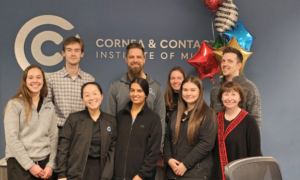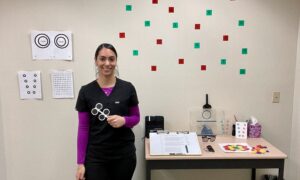May 10, 2017

By Carol L. Alexander, OD
Director, Professional Communications, Vision Care, Johnson & Johnson Vision
There are many things optometrists know to be true:
• We know regular comprehensive exams are vital to preserving vision and monitoring patients’ ocular and systemic health.
• We know patients’ eyes—and their ocular needs—can change over time.
• We know innovation in treatment options, including contact lenses, mean there is opportunity for a better patient experience year after year.
We educate patients every day on the value of eyecare. We expect our efforts to make an impact that encourages patients to take care of their eyes and lenses between visits—and to return for regular care.
Professionals know the value of educating our patients. But we may underestimate the value of educating our lawmakers who shape the policies that impact our patients, our practices, and our profession.
It is important to recognize that much of the communication we need to have with policymakers is the same as the conversations we have with patients. And just like with patients, our professional perspective matters.
Over many years of advocating on behalf of patient safety issues, and particularly those affecting contact lens wearers, I’ve developed a better understanding of how legislators approach health care issues, and what types of messaging is most impactful:
1) Legislators face a wide range of issues—and they can’t be expected to be subject matter experts on all legislation they are asked to support. Further, they understand that the stakes are high for getting polices right when it comes to health care.
2) Real patient stories and provider insights matter. Legislators rely on providers for expertise to help them understand how their decisions affect real patients as well as our industry.
Believe it or not, because of the clinical care we provide, we’re already equipped with the basic tools needed to advocate on behalf of patients.
We know how to educate first-time contact lens wearers. And because many policy makers and their aides have never worn a contact lens, it helps to provide perspective on a typical contact lens patient’s journey. For example, I like to point out that a patient’s contact lens prescription includes more than just the refractive power, and share why key components—like the expiration date and specific brand—are critical to ensuring patients’ lenses meet their unique needs.
It is also important to share that some proposals can negatively impact patient safeguards and undermine patient eye health and vision safety in the long run. Highlighting key statistics, like “99 percent of contact lens wearers have at least one unhealthy habit,” from a highly credible resource like the Centers for Disease Control and Prevention (CDC), can help underscore what eye doctors already know to be true.
But it’s even more meaningful when we connect those statistics to real patients—as importantly, our patients are policy maker’s constituents.
When we share patient examples, or when patients offer their own stories via testimony or letters, it helps a lawmaker connect a potential policy decision to its impact on the health and safety of those he or she represents.
Every practitioner has a patient story, and every one of us owes those patients a voice—after all, protecting patients is a responsibility that goes beyond simply providing clinical care.
It means contacting our legislators when a policy is proposed in our state, or at the federal level, that may affect patients’ eye health, and sharing cases of harm with the Federal Trade Commission (FTC). At Johnson & Johnson Vision, we’ve worked hard to make it as easy as possible to make eyecare professional’s voices heard. By visiting www.jnjvisiontoaction.com, providers can stay informed and easily advocate on behalf of patients and the profession.
Optometrists work with patients every day to promote vision health and eye safety. And we expect it to have an impact.
Together, we must continue to raise our voices in advocacy efforts—because optometry is making an impact.
Carol L. Alexander, OD, is director, Professional Communications, Vision Care, Johnson & Johnson Vision. To contact her: CAlexan4@its.jnj.com



























